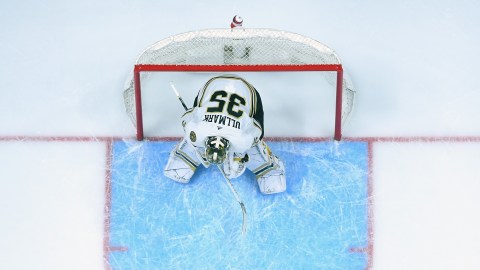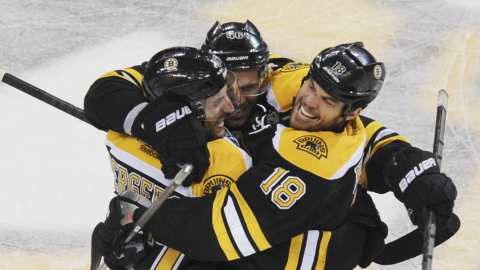That's not what the Tampa Bay Lightning and their home crowd were expecting. Not in the least.
After scoring five goals in each of the first two games of the Eastern Conference final, the Lightning were firing on all cylinders as they headed to the comfort of home. They were welcomed rudely, though, as the Bruins jumped out to an early 1-0 lead, one that they wouldn't give up.
To help explain the feeling in Tampa, FoxSportsFlorida.com's Paul Kennedy answered some of our questions.
NESN.com: Did the Bruins take the wind out of the Lightning's sails by scoring an early goal in Game 3?
Paul Kennedy: Way to go, Bruins. Way to put a damper on a perfectly good party. Over 20,000 Lightning fans on hand for the first Eastern Conference final game inside the Forum since 2004 — and the Bolts' first home-ice playoff outing since sweeping Washington on May 4 — and you knock over the punch bowl in the first 69 seconds. Unlike the wild first two games that cascaded in goals and cheers, the Bruins took one of the loudest crowds out of the game. Instead of chasing Lightning in a bottle, the B's gained pucked possession and played at a controlled tempo.
Consider that Boston, leading on its first shot of the night by David Krejci (and an assist to Milan Lucic, his first point of the Eastern Conference final) didn't register so much as a fifth collective shot on goal until only 5:01 remained in the first period. Claude Julien's team headed to the dressing room following the first owning the scoreboard and all of eight shots.
What's the rush? Tampa Bay, out of kilter, generated 10 shots in the first and just six more in the second, nearly half as many as their second period total in Game 2.
It was a peculiar 20 minutes. Seeking a shot of espresso to jolt the Bolts awake, Simon Gagne initiated a scrum at the cage with Gregory Campbell. The roughing minor was Gagne's first penalty of the entire postseason. While both went off to the box, it certainly was to Boston's advantage to trade Campbell 's absence for Gagne's.
Later, at 17:29, that was head coach Guy Boucher going nuclear at the Bolt bench when power-play specialist Marc-Andre Bergeron was whistled for elbowing Krejci. It had appeared to all but referee Steve Kozari to be quite the clean check by Bergeron, as Krejci received a soft pass in open ice with his head down a moment before Marc-Andre arrived. Bergeron did what hockey players do, offering a solid and perfectly legal hit, his left shoulder to Krejci's chest. Bergeron ended up in Chez Box, and again, advantage Boston.
So out of character would an elbowing penalty have been on Bergeron that we telephoned our exceptionally helpful STATS, Inc. research staff in Los Angeles. Let the history books show Marc-Andre's most recent elbowing offense occurred during the Bush Administration, on Oct. 25, 2008, while with the Minnesota Wild in an early season encounter with dastardly Columbus. That he would skate through two more seasons and two more clubs — Montreal and the Lightning — before this whistle indicates he is pretty close to being the last guy skating who would raise an elbow in anger. STATS, Inc. reminds us that Marc-Andre appeared in 177 NHL games between "bows."
It was just a weird night.
NESN.com: The Lightning fell behind the Penguins three games to one in the Eastern Conference quarterfinals. What can Tampa Bay take from that series in attempting to dig out of this hole against Boston?
PK: In baseball, they call it a "crooked number." A big run total on the scoreboard. If Tampa Bay comes out and scores a "crooked number" of goals in Saturday's matinee and wins, I'd be quite concerned if I were a B's fan — which I was as a kid growing up.
Here's what happened in Pittsburgh: The Bolts headed to Igloo II for the mere formality of a closeout Game 5 with the Pens, who appeared in command, leading three games to one. It was also, by coincidence, a sunny Saturday matinee, played at high noon. Acclaimed Pens goaltender Marc-Andre Fleury — a Vezina Trophy finalist with Tim Thomas, who, like Tim, had posted a shutout mere days earlier over the Bolts — didn't make it out of the second period. The Lightning struck for eight goals with a barrage of chances and won in a rout. The series returned to Tampa, where the Bolts pounced for four more. When the teams jetted back to Pittsburgh for the decisive finale, Dwayne Roloson became the first 40-year-old goalie in NHL history to record a Game 7 shutout.
I'm just saying.
As was the case in the Game 2 comeback in Boston, trailing 6-2 and finishing in a flurry before the 6-5 final, the Lightning are capable of erupting quickly. They are never out of a series — see Pittsburgh — or a game. They can score in waves and also defend under Game 7 pressure.
NESN.com: Guy Boucher was unhappy with how his team played in Game 2, especially from a defensive standpoint. Aside from the obvious breakdown on the David Krejci goal, was Boucher more satisfied with the Lightning's effort in Game 3?
PK: Again, the third period appeared to be Tampa Bay's strongest. Against a Bruins team that knows how to protect a lead, the Lightning generated a game-high 15 shots in the third alone. Boston's record, incidentally, when leading through two periods is now 35-2-2 — combining the Bruins' regular-season success with a perfect 5-0 playoff run. Against those overwhelming odds, Tampa Bay continued to compete, battling into the offensive zone and firing shots. Yet, while the effort was evident, it appeared to these eyes that the club was less than sharp throughout the night.
Credit Boston, but consider this:
Following Game 2 on Tuesday, the Lightning elected to fly home immediately following the game, arriving at 4:30 a.m. in Tampa. Place yourself in their shoes. That's a recipe for off-day sluggishness. The Bolts did not practice that day, and Thursday's game-day skate was optional. Later, under the Forum's bright lights, how many passes did you see that appeared slightly off, or just tipped by an extended Bruin stick? It was a grinding effort that even a magnificent capacity crowd couldn't ignite.
If there is to be a Game 6 in Tampa next Wednesday, Tampa Bay is considering staying over following Monday's encounter, and keeping the collective body clock on time, flying home Tuesday morning. A recognition that for a variety reasons, including the travel schedule as well as the talented Bruins, the Lightning had produced much finer performances in this playoff run than Game 3's homecoming.
NESN.com: Boucher credited the Bruins' defense for slowing the Lightning's offense. What does Tampa Bay need to do to generate some offense against Boston and Tim Thomas?
PK: The late, great Hall of Fame coach Roger Neilson would have loved Game 3. So successful with his neutral zone trap, he would have admired Boston's defensive play in slowing the Bolts through center. In Game 2, Tampa Bay's coaching staff charted 32 Lightning scoring chances to 21 for Boston — this in a game the Bolts lost 6-5. That's an incredibly high number of opportunities, the most the Lightning had registered in any game this entire season. And, even against the Bruins' coaching adjustments, the Lightning totaled 30 shots as the series arrived in Tampa. This total registered in the face of an increased emphasis on Bruin "positional hockey" as pointed out by Zdeno Chara, and the Bolts found few rebounds. Tim Thomas absorbed so many shots, while the few rebounds that did pop free were contested by Boston defensemen.
Marty St. Louis, seemingly boasting a bloody red badge of hockey courage after every game after skating at full throttle into crease traffic, lamented the absence of pressure on his old Vermont teammate in Thomas. He's convinced there should have been more. That St. Louis stated it so publicly is a strong indication his voice was also clearly heard behind closed locker room doors.
All that said, it is difficult to generate chances without the puck. Tampa Bay needs to assert itself once again in the faceoff circle. Patrice Bergeron, stellar in his return (and deservedly selected the outing's third star), dominated the dots. He won 18 of 28 draws, including 10 of 14 against Vincent Lecavalier. A salute, too, to David Krejci, whom the Tampa Bay coaching staff correctly predicted would improve upon his 3-of-18 faceoff struggles in Game 1. Thursday, Krejci reversed that total, winning all but three of 18. A terrific showing, as Boston controlled the puck time and again.
NESN.com: Which Lightning player should we expect to step up and play his best game of the series in Game 4?
If there is poetic justice in this world of hockey, my sentimental choice would be 20-year old Victor Hedman. And my second choice would be his far more experienced defensive partner, Brett Clark. They were the blue line tandem on the ice when David Krejci found himself alone with the puck in front of Bolts netminder Dwayne Roloson and promptly potted the shot that was the difference in the game. As snappy as was the B's puck movement to score, Tampa Bay's play in the goal-scoring sequence contributed to its demise.
With Boston on the attack, the puck swings to the far left corner, arriving on the stick of Milan Lucic. A review of the video shows Clark momentarily picked by the referee as he chases to apply pressure. Young Hedman (in his 14th career playoff game) reacts to his left, moving away from the crease toward the puck and instinctively toward Lucic.
Uh-oh. It's the tiniest detail that can get you killed.
Krejci, now unchecked, goes to the front of the net, and fuhgettabowdit.
In his postgame news conference, Guy Boucher refused to name Hedman as the guilty party and throw him under the Zamboni, but CSI: Tampa drew Victor's outline on the ice. As Guy said, "a young guy, excited, trying too hard to make a play." Had Hedman decided — in a nanosecond — to stay home and defend the net with Roloson, the result may have been different. And had the puck not traveled through the official's legs to the corner with Clark in pursuit, Brett may have arrived in time to disrupt Lucic's feed.
Bruins radio network analyst and former defenseman Bob Beers was an important part of Tampa Bay's 1993 expansion club. Waiting for the elevator to the press box before the game, we discussed how challenging the position is at this level, especially for younger players, given the unpredictable nature of the maturing process. This third season has been one of tremendous growth for Hedman, a towering Swede who plays in all situations. His 40 blocked shots in the postseason are evidence of his courage and heart. He ranks third in the entire Stanley Cup playoffs in blocks, right behind teammates Eric Brewer (43) and Mattias Ohlund (41). Clark has collected 37 blocks, with the limp and bruises to prove it. And that total places him in the NHL's top five.
Both are good souls and honest NHL players, with a capacity to be difference-makers.
Thanks again to Paul Kennedy for answering our questions. Please check back before every game of the Bruins-Lightning series for more Across Enemy Lines. You also can read NESN.com Bruins reporter Douglas Flynn's contributions to this feature on FOXSportsFlorida.com.



